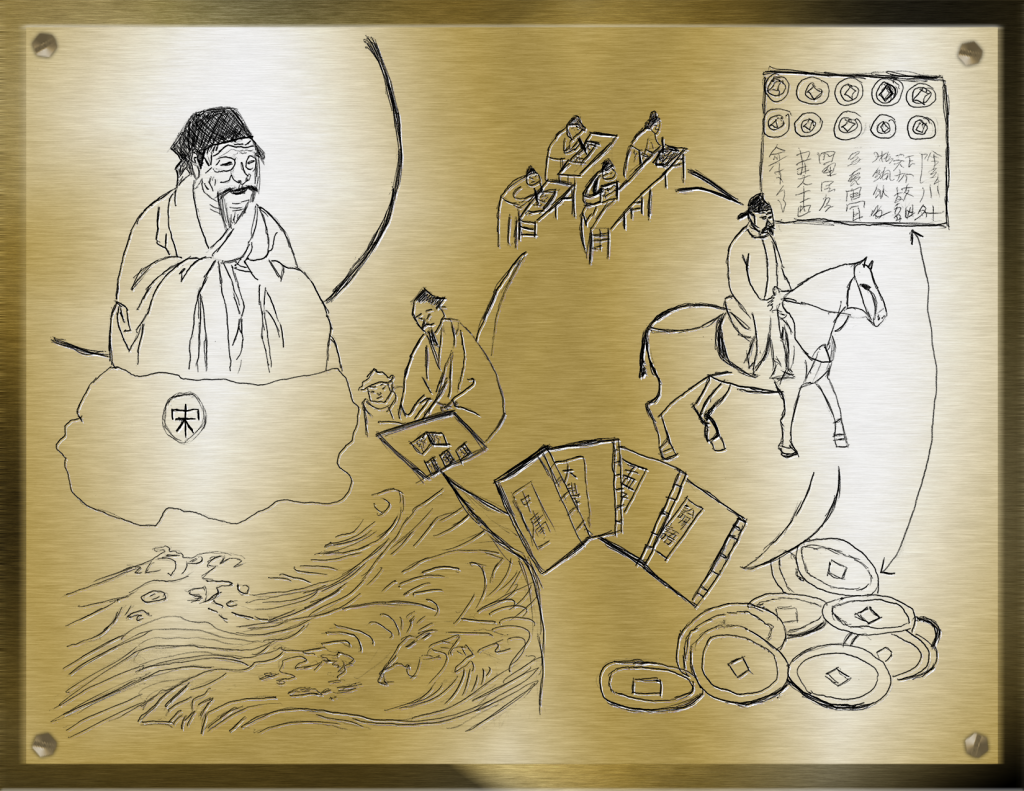
| Time Period | The Song Dynasty (960-1270) |
| Geographical Region | China |
| List of Symbols |
|
My basic theme of the plaque is that Zhuxi (1130-1200), the neo-Confucianism guru, is watching over the Chinese people studying his commentaries to the Four Books. The cycle starts off with the child. After the child studies the four books, they take the civil service exam. When they pass, they become the government official. Moreover, I have also included paper money and coin in to my plaque to show the great legacy of Song Dynasty.
The pictures on the right are coin and paper money. Paper currency was first developed during Tang China. Although it first appeared during the Tang Dynasty, the real use of paper money did not happen until the Song Dynasty. The usage of paper currency later spread throughout the country. When paper money is issued, it is issued as two parts, which are the drafts and the bills. The draft works as a receipt for the money held on paper money user’s account. The bill is issued to promise that the user can convert the paper money into real money, like silver and coin later on.
Zhuxi is the person on the left. He was a critic, poet, and artist. Zhuxi infused Confucianism with the Buddhist idea to form a Neo-Confucianism. He organized classic texts. These texts he organized contained the core doctrine of Neo-Confucianism. Zhuxi called these texts as the Four Books. During his time, he argued that people should study the Four Books. However, the organization of classic texts that brought out the core doctrine of Neo-Confucianism, the four books, were not accepted during his lifetime. After his death, a lot of people started to study his Four Books.
The civil service exam was first introduced during the Tang Dynasty. The exam during that time had serious corruption. However, in the Song period, the exam was fair. It was the Song Dynasty that popularized the fair civil service exam to appoint government officials. The growth in popularity and the people’s urge to become government officials grew. The civil service examination system assured commoners, in most cases peasants, equality in competing with the noble class. In other words, poor peasants were able to make their way to becoming equal to the noble family through the civil service exam.
In the Song Dynasty, military officials had less power than government scholar-officials. When people passed the civil service exam they were appointed as the leaders of the city. They took care of everything in the society such as teaching younger pupils, mediating minor problems, and making people pay taxes. The government officials were a very important class in the society. Not only did they take care of everything in the village, they also conducted the Confucius rituals. Because the government officials were the people who memorized and mastered the Confucius analects, they were usually very fair and clean officials. They were considered to have really good morals. As one gained more power, however, more people started to bribe. When that happened, some government officials would become very corrupt. The government recruit system worked very well but it had one flaw, corruption.
The four books are the Great Learning, the Doctrine of the Mean, the Analects of Confucius, and the Mencius. Sadly, during his time, people ignored his argument. After Zhuxi’s death, his “Four Books” was considered important study material for people who took the social service exam. The four book’s impact was huge in Asia. Even outside from China, Korea was affected by Zhuxi. Korea at this time was using Chinese as a writing system. After Zhuxi passed away, not only China but Korea later adapted the four books as study materials.
What I focused on was the legacy of the Song Dynasty. Paper money, the Four Books, and the civil service exam were all great legacies that were used even in later dynasties and the world. Other than those three things listed above, I intentionally drew the paper money on the top of the government official to represent the compensation of hard studying. Because the paper money was interchangeable to coin or silver, I have connected the coin money and paper money together.
AHN DOYOUNG is a sophomore in University of Rochester. His major is East Asian Studies and Psychology. He has been attracted to Chinese culture since childhood. He loves reading The Romance of the Three Kingdoms and has been learning Chinese for several years.
